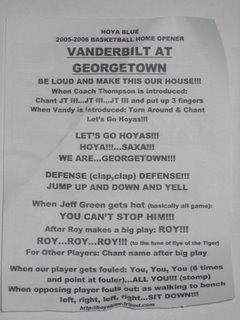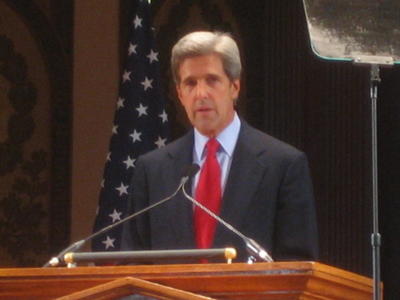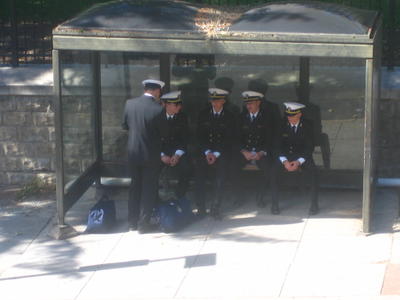Although I'm well aware that no-one other than my mother has any interest whatsoever in the academic side of life here at Georgetown (trust me, I'm the same) I thought it might be vaguely interesting to post an essay I wrote for Bureaucratic Politics. It looks at the portrayal of the bureaucracy in A Few Good Men and, geeky as this sounds, I did actually quite enjoy writing it.
Government – 439: Bureaucratic Politics
A Few Good Men - Rob Reiner (1992)
A Few Good Men is about much more than the death of a young Marine at the hands of two of his peers, and the subsequent court martial of those responsible. Through the public platform of a trial setting, Aaron Sorkin’s script conducts and leads us through an examination into the power structures within the military, exploring the culture of The Marines and the subjugation of the individual to the collective of the Corps. Sorkin and Reiner’s portrayal of the U.S. military in general, and of the Marine Corps in particular, is of an institution rigidly arranged much like any other within the bureaucracy but with every element of it taken to its furthest extreme. He also shows us a military unit where the sense of culture has become so strongly ingrained into the men under Colonel Nathan Jessep’s command, that their role as protectors of democracy and the first line of national defence has been lost, displaced by abstract conceptions of honor, code and loyalty. I intend to examine this film within the context of public administration theory and also to dissect the representation of the culture of the Marines and consequently the sense of mission within the organization. To a lesser extent I would like to explore the importance of the role Jessep attaches to “Turf”, the value he places on the autonomy of his unit and the extent to which an over-extension of the autonomy of any group or individual can, as it does in this film, result in corruption and a systematic breakdown of the bureaucratic process.
A Few Good Men is ostensibly, the story of two Marines, Lance Corporal Harold Dawson (Wolfgang Bodison) and Private Lowden Downey (James Marshall), on trial for the murder of fellow soldier, Private William Santiago. The defendants maintain that Santiago’s death was the result of a “Code Red” - an illegal disciplinary procedure - that went wrong and that they carried out on the orders of Platoon Commander Lieutenant James Kendrick (Kiefer Sutherland). Lawyer Daniel Kaffee (Tom Cruise) seeks to convince the jury to absolve the men of responsibility by proving that it is the command structure and base commanders at Guantanamo Bay that are entirely culpable for the young Marine’s death. Autonomy of action does not occur amongst the rank and file officers because, in the words of base commander Colonel Nathan Jessep (Jack Nicholson), “We follow orders or people die. It’s that simple.” The film climaxes in the courtroom in a dramatic confrontation between Kaffee and Jessep, when Kaffee, certain that the original order came from the highest authority on the Cuban base, goads the arrogant Colonel into admitting as much.
Of the numerous concepts visible in A Few Good Men, perhaps the most easily applied is that of Public Administrative Theory articulated by David Rosenbloom in Public Administrative Theory and the Separation of Powers. Rosenbloom suggests that Public Administrative Theory is inherently problematic because it is based on three separate approaches to public administration which are each based on the three branches of national government. The Managerial approach, which can be said to associate most strongly with the executive and is seen as the most impersonal or scientific of the three, stresses the importance of a rigid hierarchical structure as the key to an efficient bureaucratic system. Based upon Weber’s theory of Bureaucracy, the Managerial approach takes “top-down” view of the administration with authority derived from above and with ‘fixed jurisdictional areas ordered by rules, laws or regulations’ . The role of any individual employee is defined in terms of his or her rank or position within the agency and is said ‘to turn the individual worker into an appendage to a mechanized means of production’ . Individuals are looked upon in functional terms and the entire set-up is focused on political neutrality in order to pursue the maximization of efficiency, economy and effectiveness.
The Political approach to administration is distinctly at odds with the Managerial, pointing out that the private business organizational structure can not be applied to fit perfectly the public sector because public administration is inherently political. With its authority stemming from government, its responsibility is to the entire population rather than to private shareholders. Instead of seeking neutrality ‘the political approach stresses the values of representativeness, political responsiveness and accountability’ and instead of reducing the individual to the task they perform, it seeks to identify their interests within those of a group. As it is said to bean extension of the public and the executor of the public will the administration must be seen to be so. As a result, much greater focus is placed on means rather than ends and process is as important as results.
A Few Good Men and the trial of the two Marines can be seen to be a manifestation of the clash between these two approaches to Public Administration. Colonel Jessep and Lieutenant Kendrick clearly stand at the end of the spectrum favoring the Managerial, believing firmly in the rigid rules that govern the Marine Corps, the importance of rank dictating authority and the strict adherence to the chain of command. Throughout the film, while describing the death of William Santiago as “tragic”, both men show themselves to be cold, callous individuals with neither showing any visible signs of regret that such an incident occurred, believing it to be advantageous to national security and therefore justified. While on the witness stand, Kendrick states that ‘William Santiago is dead, and that is a tragedy, but he is dead for a reason. He is dead because he had no honor. He is dead because he had no code. And God was watching.’ Similarly, Jessep’s attitude is equally dismissive, stating that Santiago’s death ‘probably saved lives’.
To Jessep, the Marines under his command are not human beings but cogs within the machinery of national security that he, and alone, is in charge of operating. He considers himself responsible to no-one and expresses disgust and distain for anyone who questions his right to run the Marine base at Guantanamo Bay precisely as he sees fit to do so. He feels that, having risen to the rank of Colonel, and therefore having a great responsibility for the national security, both he, and the methods he chooses to employ in carrying out this job, are entirely beyond reproach and legal accountability: ‘I have neither the time nor the inclination to explain myself to a man who rises and sleeps under the blanket of freedom that I provide, and then questions the manner in which I provide it.’ he spits. Jessep is the embodiment of the ‘ends justifies the means’ approach to organizational function.
The polar opposite of Jessep can be seen in Sam Weinberg (Kevin Pollak), co-counsel for the two defendants, who represents the voice of the political approach and who refuses to distinguish the action from the actor. He believes that being ordered to do something does not absolve individuals from accountability for the consequences of their actions, regardless of where that order came from. Kaffee’s defence of the men is based on the premise that, while accountability for Santiago’s death must be found, it is to be found in the commanding officers; the strict disciplinary structure of the Marine Corps and the regimented culture of honor prevents them from questioning their superiors or disobeying orders.
The concepts of Culture and Mission within the context of the bureaucracy are closely intertwined, with the latter being a direct product of the former. James Q. Wilson describes “culture” as being ‘a persistent, patterned way of thinking about the central tasks of and human relationships within an organization’ and ’Mission’ as ’a culture that is widely shared and endorsed by operators and managers alike….[which] confers a feeling of special worth on the members’ . In any organization a strong sense of mission is important ‘but especially to a military organization in which a willingness to confront danger and perform selflessly often is the product of a shared commitment to the ethos or culture of the service. ’ In Dawson and Downey we can clearly see this as an important, if not the most important working characteristic of the Marines. JoAnne Galloway (Demi Moore) describes the Marine Corps at Guantanamo as ‘fanatical’ and as we learn of their unerring adherence to “the Code”, its mantra “Unit, Corps, God, Country”, its foundation in honor and which does not permit the individual to think of himself before his fellow Marines, we are left with little doubt that this is true. Kaffee struggles to comprehend such resolute single-mindedness as he attempts to persuade Dawson to accept the prosecutor’s offer of six months in jail if they plead guilty. Dawson refuses to do so, responding, ‘We joined the Marines because we wanted to live our lives by a certain code, and we found it in the Corps. Now you’re asking us to sign a piece of paper that says we have no honor. You’re asking us to say we’re not Marines.’ The men are, essentially, prepared to sacrifice their lives, rather than compromise their honor and integrity by admitting to the accusations they are on trial for. The sense of culture and mission can also be seen in the real-life recruitment techniques of the Marines, whose advertising slogans, including, ‘The Few. The Proud. The Marines’ and ‘Honor, Courage and Commitment’ , place emphasis on collective, elite nature of the organization.
We cannot look at A Few Good Men without discussion of the subject of “turf”. “Turf” is the ability an organization or individual has to behave autonomously of outside interference and is the asset which Jessep clearly prizes above all others. He sees himself as having risen through the military ranks to an untouchable level. Operators and managers are said to be prepared to sacrifice more tangible rewards in the workplace in return for autonomy throughout the film Jessep can be seen to embody this theory: ‘I can deal with the bullets, the bombs and the blood. I don’t want money and I don’t want medals’, he just wants to ‘run my unit as I run my unit’ . He is violently insulted that he should be forced to answer for his actions and that an external body should believe it has the authority to interfere with his job and his right to make the decisions that govern his base. When on the witness stand he reveals that he did indeed order the Code Red, it is out of this arrogant sense of self and belief that he is beyond the scope of accountability.
Nietzsche wrote, ‘Whoever fights monsters must see to it that in the process he does not become a monster.’
Ha, quoting Nietzche, what a joke. As if I've read this! Actually found it quoted in some trashy novel I read and thought it sounded approriate While the overall structural organization of the bureaucracy and the division of powers is meant to restrict individual autonomy and limit the possibility of this occurring, this system as failed the Marine Company portrayed in A Few Good Men. Jessep sees himself as responsible to no-one, free to command his ‘unit’ in as despotic and autocratic a manner as he sees fit, and the death of a young Marine was the result. The deeply ingrained sense of culture and subordination of the individual to the collective within the Marines prevents any opportunity to question the orders of their superiors. Jessep is more complicated than the quintessential cinematic villain; he repeatedly forces us to ask questions of the standards we expect from the military. Should the Marines be held to different standards in return for the sense of security they provide us with? Men like Jessep make unpleasant decisions every day, and we expect them to do so, so who are we to question their discretion? The answer Sorkin and Reiner provide us with is that, as Marines, we charge these men with the protection of humanity; the tools of accountability and limitations on autonomy are in place so that they do not lose their own sense of what that means.
 It's hard to be a miserable fecka in the presence in a room taken over by Christmas lights and containing not one but TWO! Christmas trees. But he didn't stop there. Oh no no no no (ho ho ho ho ho). Next we get a wreath on the door.
It's hard to be a miserable fecka in the presence in a room taken over by Christmas lights and containing not one but TWO! Christmas trees. But he didn't stop there. Oh no no no no (ho ho ho ho ho). Next we get a wreath on the door.
 Snow! Yes we've all seen it before and apparently you all had loads more than this at home but still this place doesn't half look purdy under a blanket of white powder.
Snow! Yes we've all seen it before and apparently you all had loads more than this at home but still this place doesn't half look purdy under a blanket of white powder. 
































